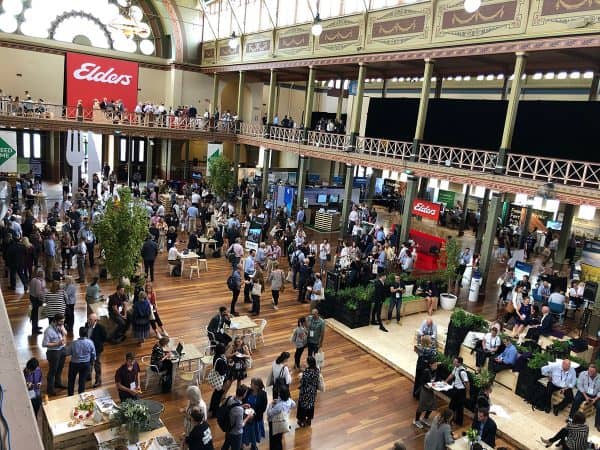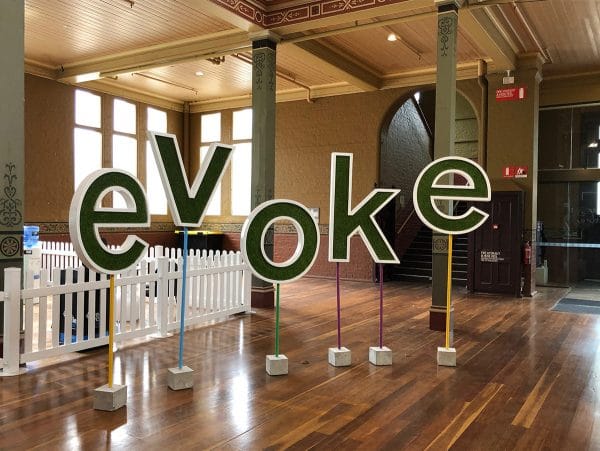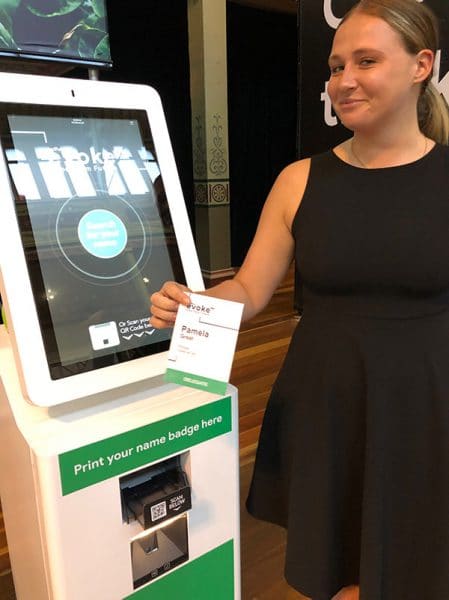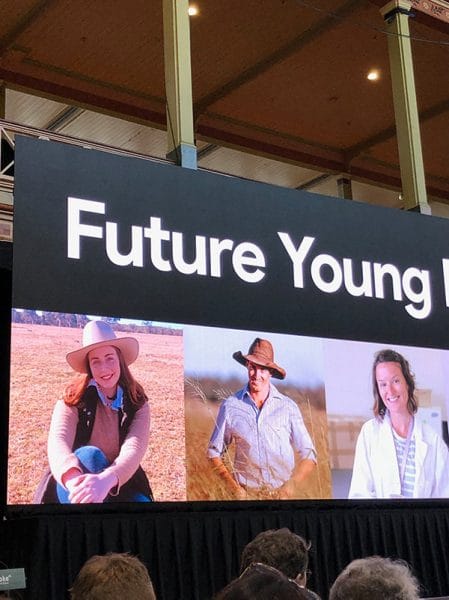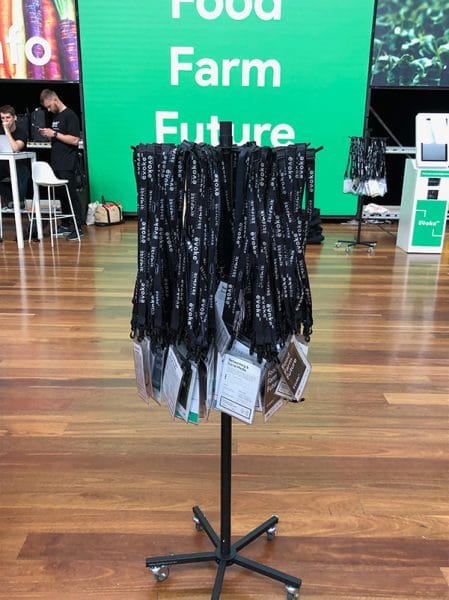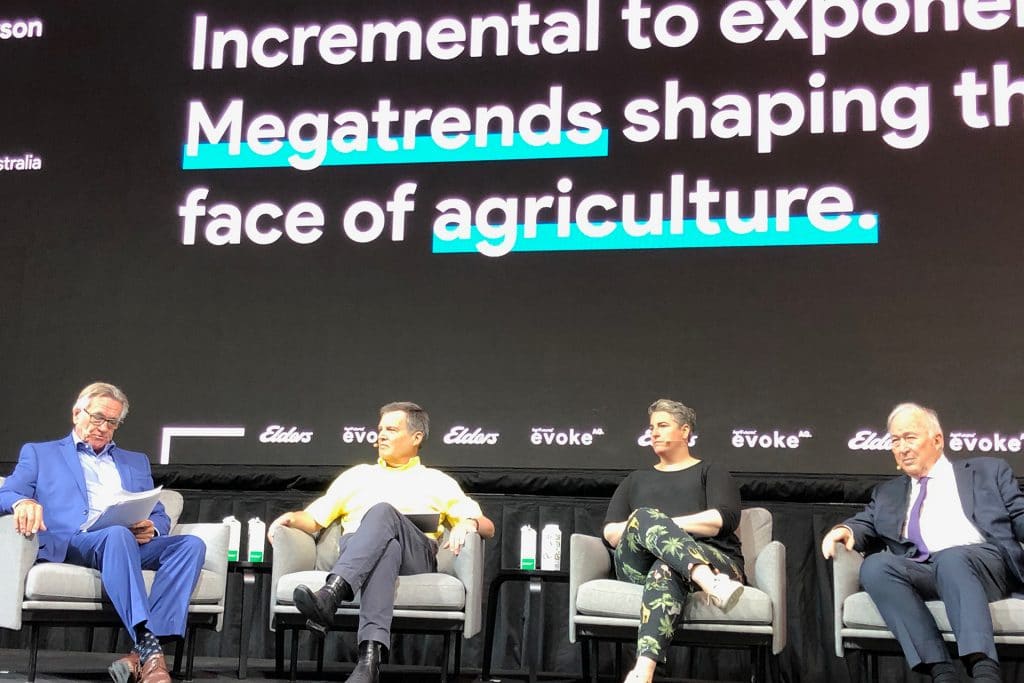evokeAG 2020 - food farm future: looking back / looking forward
Over the last decade Australia’s agriculture sector has been white papered, it has been roadmapped, it has been problematised and statistic-ised. So what can the two days of plenaries and panels of evokeAG 2020 contribute to set a winning (and clearly, therefore, also sustainable) forward course for this industry? Having recently founded Future Ag Queensland after nearly two years of helping establish the Queensland Government’s Land Restoration Fund I was keen to listen and learn. And this is what I heard.
Ag is the most exciting place to be. Callan Daley, 2019 Future Young Leader, was confident and upbeat in his prologue for the first session. Tech touches everything but we, the humans, have to pick up and use the tools. We are the ligatures powering the change and now is the time for the people in AG to recognise the opportunities and challenges, Callan urged.
Kay Hull AM, Chair of AgriFutures, continued the challenge theme setting a context of 2020 heralding the global and national end of predictability in terms of weather, rain and political systems and 40 billion to feed by 2050. This challenge is framed by climate change, with more people to be fed we live in hungrier world and at the pointy end of the consumer spectrum, customers are getting more choosy about what they eat. Mark Allison, Elders (Elders is not a start-up), urged start-ups to focus on nutrition, soil moisture conservation, pest management and genetics to drive innovation increasing profitability, productivity and sustainability.
Mike Lee brilliantly challenged AG to break free of the monoculture of ideas in which he said supermarkets have traded ecological diversity for brand diversity (with 75% of food coming from 12 plant and 5 animal species). On the brink of this hedonistic sustainability[1] is a critical opportunity food producers must seize and this ties AG directly to its positioning at the centre of debates and action about ecology, biodiversity and the challenge to our planet of a changing climate.
John Harnett of SGV Ventures & Thrive underlined that with climate change currently the #1 global concern, the younger generations of producers will focus AG on the sustainability challenge.
Collaboration is key. Courage is a necessity. Networking is a contact sport. (I think David Downs from New Zealand Trade and Enterprise was the first to wryly insert the sporting metaphor into the ANZ conversation.) Andrew Coppin (Farmbot Monitoring Solutions Australia) and Sarah Nolet (CSIRO) spoke further on the challenges of integration, innovation and collaboration between tech and producers to validate the pathway between producers and market impact. Successive speakers across all plenaries repeated the need for more connection between what happens in the ‘paddock’, science, research, start-ups, government policy and initiatives, trade and logistics. Better communication is key to improved collaboration and market penetration globally. AG is one big messy complex ecosystem with producers and farmers at its throbbing excited heart and choosy and hungry consumers at its fingertips.
Some of the ‘funner’ sessions were those where key speakers agreed to disagree: memorable was the debate between Justin Webb – AgriWebb and Michael Fox - Fable Food Co, skilfully facilitated by Arianna Sippel from Austrade. The protein debate continued as a follow-up with the charming Damon Gameau’s storied close of Monday’s proceedings - his positive vision for 2040.
For the Tuesday morning plenary chaired by Barrie Cassidy, Bill Hurditch (The Fifth Estate), John Henderson (AirTree) and the sparkling Rachel Neumann (Amazon Web Services) sat in a line with the man whose claim to fame - out of his own mouth - is having eaten more hamburgers than anyone else in Australia – Jack Cowin of Hungry Jacks and (impossible) Rebel Whopper. Here we heard about using maggots to break down food waste as a step in producing animal food and fertiliser (talk about a virtuous circle). We heard how investment in start-ups is still a rounding error on the balance sheet of Australia’s super funds (Neumann), the vital relationships between logistics, agtech and biology (Hurditch), and how crucial it is for AG start-ups to tell the story about how the jobs being lost today in traditional industries in regional Australia can and will transition to jobs (that today do not exist) of tomorrow (Henderson).
A word about behind the scenes: huge accolades and thanks to the black t-shirted brigades who provided the welcome, directions, and ferried food. A shout out to the most professional and exceptional A/V I have experienced: no failed microphones, powerpoints or videos here.
Reader, I filled up 100 pages of my notebook with scribbles of important information, witty jokes (you had to be in the room, sorry) and powerful ideas and opinions. PODCASTS from evokeAG 2020 are available at the evokeAG podcast channel podnews.netpostcast/1458966229 - thanks to Fleur Andersen and team. Just download the app and listen in. I wrap up this summary with a couple of personal opinions about what might make evokeAG 2021 (Perth February 16&17) an even more provocative and powerful two days of experience and persuasion.
Keep the creative acknowledgement of country at the beginning but please find ways to involve custodians and traditional owners who are doing amazing things with teaching traditional land, water and fire management as well as those producing old and new food and medicines (green ant gin?).
Incorporate more producer voices in plenaries and panels rather than having others report on their behalf. It would also be great to hear more from both scientists/researchers and conservationists as ANZ AG surges into the decade where our very survival will be determined through collaboration, innovation and change, drawing forth the grit and determination that has characterised agricultural production in this country for more than 60,000 years.
And remember, as John Harvey from AgriFutures said in the closing plenary: The status quo is not going to last.
The last word for now is the question put to evokeAG 2020 participants by Callan Daley: How will you contribute in the next 12 months to the evocation[2] of ANZ AG?
[1] http://citeseerx.ist.psu.edu/viewdoc/download?doi=10.1.1.1020.2198&rep=rep1&type=pdf The concept of hedonistic consumerism has been popularised by Danish Architect Bjarke Ingels.
[2] Evocation: the action or an act of calling into existence or activity something non-existent or latent. OED
